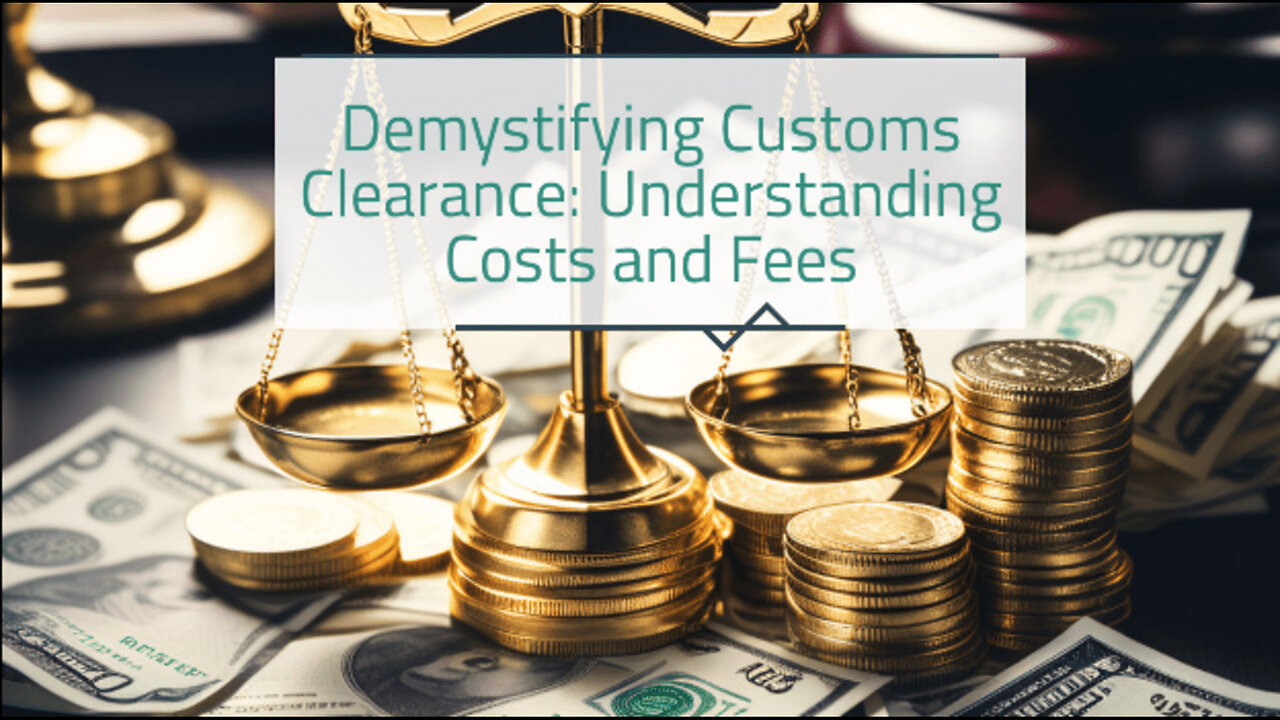Premium Only Content

Mastering the Art of Customs Clearance: Unraveling the Costs of Importing
ISF Checklist || 805-970-7918 || contact@isfchecklist.com || www.isfchecklist.com
In today's video, we deep dive into the topic of understanding the costs of customs clearance, which is crucial for importers. The costs of customs clearance can vary and depend on factors such as the country of import, the value of the goods, the mode of transportation, and any additional services required.
One of the main costs of customs clearance is the customs bond. This is a financial guarantee that importers must obtain to ensure compliance with customs regulations and protect against duty or tax evasion. The cost of the customs bond can vary based on factors such as the value of the goods, the type of bond required, and the duration. Importers should work with a licensed customs broker to obtain the most suitable and cost-effective bond.
Another cost to consider is the customs brokerage fee. Customs brokers play a crucial role in facilitating the smooth clearance of goods through customs by handling documentation, communicating with authorities, and ensuring compliance. The customs brokerage fee can be a flat fee, a percentage of the shipment value, or a combination of both. Importers should evaluate the value provided by the customs broker and the fees charged to make an informed decision.
Freight forwarding charges are also an important cost to consider. If importing goods from another country, a freight forwarder is often needed to handle transportation. The charges for freight forwarding services can vary based on factors such as the mode of transport, distance traveled, and additional services required. Importers should obtain quotes from different freight forwarders to ensure competitive pricing.
Inspections or examinations conducted by customs authorities can also lead to additional costs. Customs officers may inspect goods to verify their accuracy and compliance with regulations. These inspections can result in charges such as examination fees or storage fees. Importers should be aware of the inspection procedures and associated costs to avoid any surprises.
Lastly, importers need to consider the Importer Security Filing (ISF) fee. This is a mandatory filing that importers are required to submit to US Customs and Border Protection before the cargo is loaded onto the vessel. The ISF provides advance information about the imported goods to assess security risks. Importers should ensure timely and accurate filing to avoid penalties or delays.
Understanding the costs of customs clearance is essential for importers to budget effectively and plan their logistics. By considering the customs bond, customs brokerage fees, freight forwarding charges, inspection costs, and the ISF fee, importers can have a comprehensive understanding of the financial aspects of the customs clearance process.
#usimportbond #isfcustomsbroker #uscustomsclearing #isfentry
Video Disclaimer Here: This video is purely educational and has no ties with the US government.
00:06 Understanding the costs of customs clearance is crucial for importers to budget effectively and plan their logistics.
00:24 Importers should be aware of various costs involved in customs clearance, such as customs bond, customs brokerage fees, freight forwarding charges, inspection costs, and ISF fee.
00:43 Customs bond acts as a security deposit to ensure compliance with customs regulations, while customs brokerage fees cover services provided by customs brokers.
01:52 Importers should compare quotes from different freight forwarders to ensure competitive pricing and understand inspection procedures to avoid surprises.
-
 8:31
8:31
MattMorseTV
23 hours ago $1.28 earnedTexas just did the IMPOSSIBLE.
55.7K75 -
 LIVE
LIVE
Rotella Games
17 hours agoGreen Hell Day 6 | We Have a LONG Way to Go
172 watching -
 LIVE
LIVE
Lofi Girl
2 years agoSynthwave Radio 🌌 - beats to chill/game to
347 watching -
 41:26
41:26
The Mel K Show
4 hours agoMel K & Clay Clark | Financial Success Hides Behind Self Discipline: Five Pillars | 8-24-25
15.3K2 -
 LIVE
LIVE
The Rabble Wrangler
11 hours agoThe Best in the West Plays Battlefield 2042 | Road to BF6 Grind
39 watching -
 LIVE
LIVE
JTtheSG
58 minutes agoBack To The Deadzone!!!
57 watching -
 LIVE
LIVE
The Official Steve Harvey
12 days ago $5.07 earned24 HOURS OF MOTIVATION w/ STEVE HARVEY
401 watching -
 25:56
25:56
DeVory Darkins
21 hours ago $0.66 earnedTrump drops ULTIMATE BOMB on Democrat Mayors as ICE makes SHOCKING Announcement
40.6K169 -
 3:36:30
3:36:30
TonYGaMinG
6 hours ago🟢 ABI WITH FRIENDS | 🍩JOE DONUTS | 😶 🌫 VLADSGAMINGCARTEL |
21.3K4 -
 21:24
21:24
marcushouse
12 hours ago $0.10 earnedStarship Flight 10: Go or No? 🚀
29.8K12